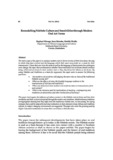Please use this identifier to cite or link to this item:
https://cris.library.msu.ac.zw//handle/11408/1837Full metadata record
| DC Field | Value | Language |
|---|---|---|
| dc.contributor.author | Nhongo, Raphael | - |
| dc.contributor.author | Masuku, Jesta | - |
| dc.contributor.author | Dlodlo, Sindile | - |
| dc.date.accessioned | 2016-10-18T07:53:34Z | - |
| dc.date.available | 2016-10-18T07:53:34Z | - |
| dc.date.issued | 2015 | - |
| dc.identifier.issn | 1815-9036 | - |
| dc.identifier.uri | http://hdl.handle.net/11408/1837 | - |
| dc.description.abstract | The main scope of the paper is to analyze modern oral art forms in view of their functions, the way in which they have evolved and the language which their users now prefer as a mode for their transmission. Given that over time the mode as well as the language of transmission has undergone some change, the paper then problematizes whether these traditional oral art forms should continue being called oral art forms in their modern state or they should just be labeled as art forms. By using Ndebele oral traditions as a basis for argument, the paper seeks to answer the following questions: Are modern oral art forms still playing the same roles as those of the traditional Ndebele society did? What are the effects of using the English language medium in the transmission of African oral traditions? What new dimension have modern oral art forms taken in transmission, form and content? What is the relevance and the implications of teaching contemporary oral traditions at universities and other institutions of learning? This paper interrogates the influence of culture contact on the Ndebele oral art forms and how their worldview and their culture is projected through the modern oral traditions. Modern literary traditions are highlighted showing how they differ from the traditional Ndebele ones. In concluding, the coping strategies that could be adopted by learning institutions in their attempts to keep African oral traditions relevant in today’s changing environments are suggested. The paper also notes the growing need by Higher Education institutions to review their curriculum in that direction. | en_US |
| dc.language.iso | en | en_US |
| dc.publisher | Midlands State University | en_US |
| dc.relation.ispartofseries | The Dyke;Vol. 9, No. 2; p. 85-105 | - |
| dc.subject | Ndebele culture | en_US |
| dc.title | Remodelling Ndebele culture and sensibilities through modern oral art forms | en_US |
| dc.type | Article | en_US |
| item.languageiso639-1 | en | - |
| item.openairetype | Article | - |
| item.fulltext | With Fulltext | - |
| item.grantfulltext | open | - |
| item.openairecristype | http://purl.org/coar/resource_type/c_18cf | - |
| item.cerifentitytype | Publications | - |
| Appears in Collections: | Research Papers | |
Files in This Item:
| File | Description | Size | Format | |
|---|---|---|---|---|
| ndebele culture.pdf | Full Text | 13.32 MB | Adobe PDF |  View/Open |
Page view(s)
142
checked on Feb 4, 2026
Download(s)
1,224
checked on Feb 4, 2026
Google ScholarTM
Check
Items in MSUIR are protected by copyright, with all rights reserved, unless otherwise indicated.



